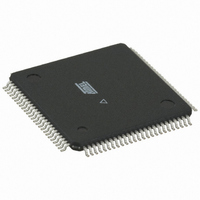ATMEGA6490A-AU Atmel, ATMEGA6490A-AU Datasheet - Page 300

ATMEGA6490A-AU
Manufacturer Part Number
ATMEGA6490A-AU
Description
IC MCU AVR 64K FLASH 100TQFP
Manufacturer
Atmel
Series
AVR® ATmegar
Specifications of ATMEGA6490A-AU
Core Processor
AVR
Core Size
8-Bit
Speed
20MHz
Connectivity
SPI, UART/USART, USI
Peripherals
Brown-out Detect/Reset, LCD, POR, PWM, WDT
Number Of I /o
69
Program Memory Size
64KB (32K x 16)
Program Memory Type
FLASH
Eeprom Size
2K x 8
Ram Size
4K x 8
Voltage - Supply (vcc/vdd)
1.8 V ~ 5.5 V
Data Converters
A/D 8x10b
Oscillator Type
Internal
Operating Temperature
-40°C ~ 85°C
Package / Case
100-TFQFP
Processor Series
ATmega
Core
AVR
Data Bus Width
8 bit
Data Ram Size
4 KB
Interface Type
SPI, USART
Maximum Clock Frequency
20 MHz
Number Of Programmable I/os
69
Number Of Timers
3
Operating Supply Voltage
3.3 V
Maximum Operating Temperature
+ 85 C
Mounting Style
SMD/SMT
Minimum Operating Temperature
- 40 C
Operating Temperature Range
- 40 C to + 85 C
Lead Free Status / RoHS Status
Lead free / RoHS Compliant
Available stocks
Company
Part Number
Manufacturer
Quantity
Price
Company:
Part Number:
ATMEGA6490A-AU
Manufacturer:
Atmel
Quantity:
1 250
Company:
Part Number:
ATMEGA6490A-AUR
Manufacturer:
Maxim
Quantity:
43
- Current page: 300 of 712
- Download datasheet (41Mb)
26.6
26.7
8284A–AVR–10/10
Entering the Boot Loader Program
Addressing the Flash During Self-Programming
Entering the Boot Loader takes place by a jump or call from the application program. This may
be initiated by a trigger such as a command received via USART, or SPI interface. Alternatively,
the Boot Reset Fuse can be programmed so that the Reset Vector is pointing to the Boot Flash
start address after a reset. In this case, the Boot Loader is started after a reset. After the applica-
tion code is loaded, the program can start executing the application code. Note that the fuses
cannot be changed by the MCU itself. This means that once the Boot Reset Fuse is pro-
grammed, the Reset Vector will always point to the Boot Loader Reset and the fuse can only be
changed through the serial or parallel programming interface.
Table 26-4.
Note:
The Z-pointer is used to address the SPM commands.
Since the Flash is organized in pages (see
be treated as having two different sections. One section, consisting of the least significant bits, is
addressing the words within a page, while the most significant bits are addressing the pages.
This is shown in
are addressed independently. Therefore it is of major importance that the Boot Loader software
addresses the same page in both the Page Erase and Page Write operation. Once a program-
ming operation is initiated, the address is latched and the Z-pointer can be used for other
operations.
The only SPM operation that does not use the Z-pointer is Setting the Boot Loader Lock bits.
The content of the Z-pointer is ignored and will have no effect on the operation. The LPM
instruction does also use the Z-pointer to store the address. Since this instruction addresses the
Flash byte-by-byte, also the LSB (bit Z0) of the Z-pointer is used.
Bit
ZH (R31)
ZL (R30)
ATmega169A/169PA/329A/329PA/649A/649P/3290A/3290PA/6490A/6490P
BOOTRST
1
0
1. “1” means unprogrammed, “0” means programmed
Boot Reset Fuse
Figure 26-3 on page
Z15
15
Z7
7
Reset Address
Reset Vector = Application Reset (address 0x0000)
Reset Vector = Boot Loader Reset (see
Z14
14
Z6
6
(1)
Z13
13
Z5
5
301. Note that the Page Erase and Page Write operations
Table 27-13 on page
Z12
Z4
12
4
Z11
Z3
Table 26-9 on page
11
3
Z10
Z2
10
2
325), the Program Counter can
307)
Z9
Z1
9
1
Z8
Z0
8
0
300
Related parts for ATMEGA6490A-AU
Image
Part Number
Description
Manufacturer
Datasheet
Request
R

Part Number:
Description:
Manufacturer:
Atmel Corporation
Datasheet:

Part Number:
Description:
IC AVR MCU FLASH 64K 64-QFN
Manufacturer:
Atmel
Datasheet:

Part Number:
Description:
IC AVR MCU FLASH 64K 64TQFP
Manufacturer:
Atmel
Datasheet:

Part Number:
Description:
IC AVR MCU FLASH 64K 5V 64TQFP
Manufacturer:
Atmel
Datasheet:

Part Number:
Description:
IC AVR MCU FLASH 64K 5V 64QFN
Manufacturer:
Atmel
Datasheet:

Part Number:
Description:
MCU AVR 64KB FLASH 16MHZ 64QFN
Manufacturer:
Atmel
Datasheet:

Part Number:
Description:
IC MCU AVR FLASH 64K 64TQFP
Manufacturer:
Atmel
Datasheet:

Part Number:
Description:
Manufacturer:
Atmel Corporation
Datasheet:

Part Number:
Description:
Manufacturer:
ATMEL Corporation
Datasheet:

Part Number:
Description:
Manufacturer:
ATMEL Corporation
Datasheet:

Part Number:
Description:
IC AVR MCU 64K 16MHZ 5V 64TQFP
Manufacturer:
Atmel
Datasheet:

Part Number:
Description:
IC AVR MCU 64K 16MHZ 5V 64-QFN
Manufacturer:
Atmel
Datasheet:

Part Number:
Description:
IC AVR MCU 64K 16MHZ COM 64-TQFP
Manufacturer:
Atmel
Datasheet:

Part Number:
Description:
IC AVR MCU 64K 16MHZ IND 64-TQFP
Manufacturer:
Atmel
Datasheet:

Part Number:
Description:
IC AVR MCU 64K 16MHZ COM 64-QFN
Manufacturer:
Atmel
Datasheet:











